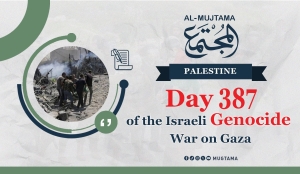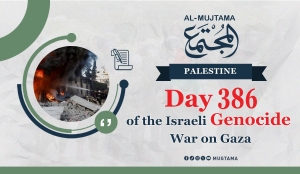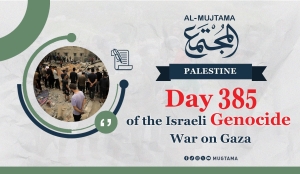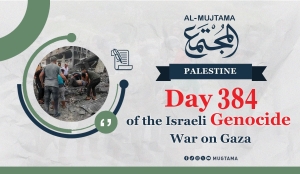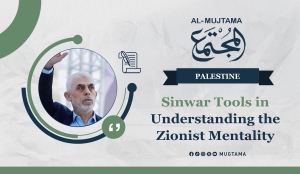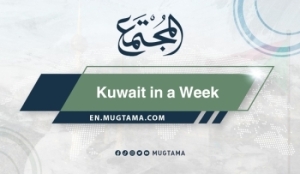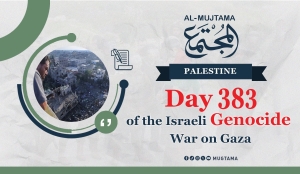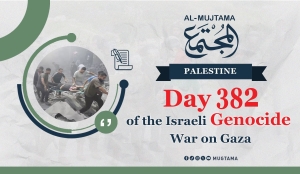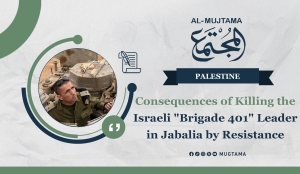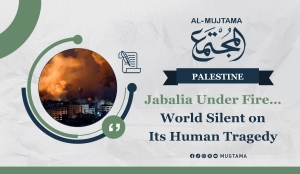Admin Mugtama
Day 387 of the Israeli Genocide War on Gaza
October 27, 2024
On the 387th day of the "Al-Aqsa Flood" operation, the occupying forces persist in launching air attacks and heavy shelling on Gaza, leading to brutal killings of innocent civilians.
Death toll in the northern Gaza Strip
The Ministry of Health in Gaza announced the martyrdom of more than 1000 citizens in the besieged northern sector during the past three weeks, indicating that 30 medical personnel are missing after being arrested by the occupation forces from inside Kamal Adwan Hospital.
The Ministry's spokesperson, Khalil al-Dukran, blamed the Israeli occupation for the lives of medical personnel, confirming that the occupation seeks to deliberately disable the health system in the north in order to cause the greatest number of casualties.
Al-Dukran added that the situation in northern Gaza has become unbearable, appealing to the international community to act immediately to save civilians before it is too late.
Gaza Government Media Office condemns the silence of international organizations
The Gaza Government Media Office strongly condemned the clear neglect of international organizations operating in the sector, affirming that this negligence fuels the occupation's persistence in committing monstrous crimes.
The statement issued by the office on Saturday evening stated that these organizations deal with the critical conditions in the sector with complete indifference, without paying attention to the suffering of civilians in northern Gaza, especially in Jabalia and Beit Lahia.
The statement pointed out that these organizations have not fulfilled their humanitarian role as mandated by international law, as they have ignored providing necessary support such as food, water, and healthcare, leaving the Palestinian people to suffer deliberate starvation for over 180 days without meaningful assistance.
The Government Media Office also reported that international organizations have not provided the minimum level of medical assistance and have not supported medical teams and facilities sufficiently to address the deteriorating situation in northern Gaza.
The statement added that the negligence of these organizations contributed significantly to the acceleration of the collapse of the healthcare system, as they did not intervene to provide medicines and essential supplies, and did not support medical teams in the face of water and food shortages.
The office emphasized that these organizations have shown a complete inability to provide any tangible support to protect human rights, or even facilitate communication for families separated due to arrests and forced displacement, with more than 250 individuals still abducted by the occupation and thousands of families forcibly displaced.
The office called on international organizations to fully assume their humanitarian responsibilities.
Quality ramming operation in "Tel Aviv"
In an operation described by the Palestinian media as a quality one, a Palestinian carried out a ramming operation with a truck near the Mossad headquarters in "Tel Aviv", resulting in the killing of 6 Zionist soldiers and the injury of around 50 others, some of them in critical condition.
Hebrew reports confirmed that a number of soldiers are still trapped under the truck in a dangerous situation.
On the other hand, Palestinian factions praised the operation and considered it a legitimate response to the ongoing occupation crimes.
"Hezbollah" warns residents of 25 settlements
In an escalatory move, the Lebanese "Hezbollah" issued a warning to residents of 25 settlements in northern occupied Palestinian territories to evacuate immediately, affirming that these settlements have become legitimate targets for their military and missile forces, as they are used as launching points for "Israeli" attacks against Lebanon.
The warning included multiple settlements, including Kiryat Shmona, Nahariya, Karmiel, and others, in what is considered a significant escalation amid continued tension on the Lebanese border.
Talks in Doha about a prisoner exchange and ceasefire
The Qatari capital of Doha is set to host talks today, Sunday, involving officials from the American CIA and the "Israeli" Mossad, to discuss the possibility of reaching a deal for a prisoner exchange with Hamas and a ceasefire in Gaza, according to Al Jazeera Net.
Day 386 of the Israeli Genocide War on Gaza
October 26, 2024The Zionist occupiers are still carrying out genocide in Gaza for the 386th day, with numerous airstrikes and artillery attacks causing civilian massacres in a dire humanitarian crisis due to the blockade and displacement of over 95% of the population.
Our correspondents reported that the occupation aircraft and artillery continued their violent airstrikes and shelling on various parts of the Gaza Strip on Saturday, targeting homes, displaced persons' gatherings, and streets, resulting in dozens of martyrs and wounded.
The occupation forces continued their ground invasion of wide areas in Rafah since May 7th, as well as several axes in Gaza, amidst aerial and artillery bombardment and the commission of horrific massacres.
A martyr from the Zaqout family was killed when the occupation aircraft bombed a two-story house on Tunnel Street in Gaza City.
Two martyrs were killed in Zionist artillery shelling on citizens' homes in Jabalia Al-Nuzla in northern Gaza.
The occupation forces committed a horrific massacre this evening in the town of Beit Lahia in northern Gaza after bombing 5 houses belonging to the families of "Al-Masri," "Abu Shidq," and "Salman" near the western roundabout in Beit Lahia, resulting in more than 30 martyrs and injuries, amidst appeals for ambulance crews to rescue them.
Our correspondent reported that the occupation forces hindered the work of ambulance and civil defense teams, meaning that the victims sometimes have to be rescued and treated individually.
Local sources reported the martyrdom of Adham Mohammad Sameer Al-Hadidi as a result of an Israeli airstrike east of Al-Bureij while a special Zionist force arrested citizens in the area.
For the 22nd consecutive day, northern Gaza, particularly Jabalia camp and Beit Lahia, are suffering under an Israeli siege and starvation amidst intense aerial and artillery bombardment, and complete isolation of the northern governorate from the rest of Gaza.
Martyrs and others were injured in the occupation's bombing of a house belonging to the Abu Shidq family near the western roundabout in Beit Lahia.
Al-Awda Hospital announced that the Zionist occupation forces arrested Dr. Mohammed Obeid, head of the reconstructive surgery and orthopedic department at Al-Awda Hospital in Tel Al-Zaatar, northern Gaza, from inside Kamal Adwan Hospital and took him to an unknown location.
Citizen Hani Ismail Al-Najjar, from the town of Khuza'a, died from wounds sustained a week ago during the occupation's targeting of his tent west of Khan Younis.
Jana Jawad Mahdi was killed and 3 others were injured in the occupation's shelling in the Qizan Abu Rushwan area south of Khan Younis.
Four citizens were injured and taken to the European Gaza Hospital as a result of the occupation's bombing of a house belonging to the Abu Telakh family northeast of Rafah, with reports of martyrs under the rubble.
Local sources reported the martyrdom of the son of Kamal Adwan Hospital director in northern Gaza, Dr. Hussam Abu Safia.
Jana Jawad Mahdi was martyred and 3 others were injured in a shelling in the Qizan Abu Rashwan area south of Khan Younis city.
Red Crescent teams reported martyrs and casualties in an attack on a house belonging to the Maqat family in the east of Burka Al-Sheikh Radwan in Gaza City, damaging a number of surrounding houses.
A number of citizens were injured after bombs were dropped by Quadcopter aircraft near the Khallet al-Betrol station in Jabalia al-Nazla, north of the Gaza Strip.
Two citizens were martyred in an Israeli artillery shelling that targeted Abd Rabbo Street in Jabalia Balad, north of Gaza.
Medical sources reported that a martyr arrived at Al-Awda Hospital in eastern Al-Bureij after Quadcopter drones fired at citizens and wood collectors.
Several citizens were injured after gunfire from a Quadcopter targeted residents in the Sabra neighborhood south of Gaza City.
One citizen was martyred and others were injured in a raid carried out by the occupation on the town of Al-Zawayda in central Gaza.
The Israeli occupation army continued to carry out digging and excavation operations around Kamal Adwan Hospital in northern Gaza, and carried out destruction operations at the hospital's facilities, burning ambulance vehicles inside the hospital. Some houses in the surrounding area were also set on fire.
Eyewitnesses reported that the occupying forces worked to demolish residential buildings around the Faloja Cemetery in Jabalia camp in the northern Gaza Strip.
Other witnesses mentioned that explosions and gunfire from military vehicles continued for more than two hours in the Tawam and Safati neighborhoods.
The occupation aircraft bombed the western areas of the Nusairat camp in the middle of the Gaza Strip.
The occupation artillery shelled the eastern part of the Bureij in the middle of the Gaza Strip early in the morning.
Israeli aircraft launched an airstrike on Gaza City.
The Palestinian Ministry of Health announced last night that the current situation in Kamal Adwan Hospital is deteriorating significantly.
The Ministry stated that the total number of people inside the hospital is 600, including patients, wounded, medical staff, and accompanying individuals.
They confirmed the martyrdom of two children in the intensive care unit after the hospital generators stopped and the oxygen station was targeted.
They also mentioned the destruction of 3 ambulances and a transportation vehicle, hindering relief and transportation operations, as well as the destruction of the electricity generation system through solar panels, exacerbating the crisis.
The ministry stated that the current number of patients and wounded is 195, while the number of medical staff is 70. Three nurses and a janitor were injured during the ongoing events.
They pointed out that the occupation forces are searching the hospital and firing inside the different sections, increasing the state of panic and concern.
They also pointed out that these conditions require urgent intervention from humanitarian organizations to ensure the safety of everyone and provide for their necessary needs.
Day 385 of the Israeli Genocide War on Gaza
October 25, 2024On the 385th day of the Israeli aggression, the occupation committed a new massacre in Khan Yunis resulting in the martyrdom of around 30 people.
Local sources reported the martyrdom of 28 Palestinians in an Israeli airstrike targeting residential houses in the Manara area south of Khan Yunis city early this morning.
Sources confirmed that Israeli occupation forces targeted a house in the Manara area south of Khan Yunis city, resulting in the martyrdom of 28 citizens, mostly children and women, with dozens others sustaining various injuries.
The eastern areas of Khan Yunis city in southern Gaza were subjected to intense Israeli artillery shelling on Thursday evening, causing hundreds of Palestinian families to flee.
Eyewitnesses said that the Israeli artillery targeted the neighborhoods of Manara, Maan, Sheikh Nasser, and the outskirts of Khuza'a Al-Najjar in the south and east of the city.
Eyewitnesses also pointed to a mass exodus of hundreds of Palestinian families towards the west of Khan Yunis due to the ongoing Israeli shelling targeting several neighborhoods in the area.
The intense artillery shelling appears to be preparing for a possible ground incursion in the eastern areas of Khan Yunis. This comes as Gaza continues to count its martyrs as a result of the violent raids that have targeted several areas.
Civil defense announced more than 150 civilians killed or injured in an occupation shelling on Jabalia camp.
Civil defense also mentioned that the occupation imposes a suffocating siege on the areas hosting displaced persons and residents, describing the situation in Beit Lahia and Jabalia as a disaster.
The Ministry of Health announced yesterday, Thursday, that the death toll of the Israeli aggression has risen to 42,847 martyrs and 100,544 injuries since October 7th last year.
Day 384 of the Israeli Genocide War on Gaza
October 24, 2024
On the 384th day of the "Al-Aqsa Tempest" operation, the occupation forces persist in conducting air strikes and heavy artillery bombardments in Gaza Strip, resulting in horrendous massacres of civilians.
Massacre in a school hosting displaced persons in Nusairat.
The Zionist occupation forces committed a new massacre today, Thursday, against civilians in the "Martyrs of Nusairat" school in the Central Governorate, which was hosting displaced persons, resulting in the martyrdom of 17 people, including 9 children, and more than 52 others were injured to varying degrees.
According to Palestinian sources, there are still people missing under the rubble, reflecting the worsening humanitarian tragedy.
The Gaza Government Media Office condemned this crime, stating that the occupation army was fully aware that the school was hosting thousands of displaced persons, mostly children and women who were displaced by repeated airstrikes on residential neighborhoods.
The statement added that this massacre brings the number of shelters targeted by shelling to 196, which house hundreds of thousands of displaced people fleeing the ongoing aggression.
Massacres in northern Gaza for the 20th day.
The massacres in northern Gaza have continued for 20 days, as the occupation intensifies its targeting of densely populated residential areas, leading to the displacement of hundreds of thousands of citizens.
Northern Gaza is suffering from widespread destruction of homes and vital facilities, with hospitals destroyed and food and medicine supplies cut off, exacerbating the humanitarian crisis.
In Jabalia camp, Safatawi and Tawam areas, the occupation continues to demolish homes and force residents to evacuate south, while many families refuse to leave their homes despite continued shelling.
In this context, civilians are suffering from the ongoing siege, making it difficult to evacuate the sick and injured, worsening the health situation in the region.
Civil Defense services in northern Gaza are suspended.
The Palestinian Civil Defense teams have announced the suspension of their humanitarian services in the northern Gaza Governorate due to direct threats from the occupation forces.
The Civil Defense spokesperson stated that the occupation targeted the working crews, resulting in injuries among its members, leading to the cessation of rescue and ambulance operations in the affected area.
"Hamas": Incitement against journalists is a prelude to targeting them
Hamas said the claims made by the Zionist occupation army that some Al Jazeera journalists are part of the resistance movements while reporting on the atrocities in northern Gaza are false and incite violence against them.
"Hamas" added in a statement that this comes within its fascist policy that has led to the deaths of about 177 journalists, terrorizing and preventing them from carrying out their mission, and covering up the atrocities committed, as well as blatant violations.
It emphasized that the false allegations of the occupation are a premeditated announcement of its intention to target Al Jazeera journalists, as well as their colleagues from the channel and many local and international media agencies and institutions over a year of systematic extermination and killing.
"Hamas" is conducting intensive communications to thwart the "Generals' Plan"
The movement declared that it has initiated a campaign of movements, political and diplomatic communications to thwart the occupation's plans and stop the comprehensive crime being committed by the occupation within the framework of the extermination war and open massacres at the sector level, specifically in the northern Gaza Strip.
As per a report, Hamas leadership has cautioned against the Generals' Plan and its repercussions of displacement and destruction, highlighting the severe daily massacres, including the killing of children and women, and the organized displacement of approximately 150,000 individuals. This has led to deprivation and starvation among our people, with destruction of infrastructure, such as hospitals, and lack of basic necessities like food, medicine, and water sources.
It also mentioned that delegations from the leadership of the movement are currently visiting Turkey, Qatar, and Russia, as well as communications with Egypt, the United Nations, and Iran.
Sinwar Tools in Understanding the Zionist Mentality
October 24, 2024
Yahya Sinwar has emerged as one of the most important Palestinian leaders who have succeeded in deeply understanding the Zionist mentality, starting from inside the prisons, where he spent time learning the language of the enemy and understanding their culture and history, allowing him to access the strategies of the occupation and its orientations.
He relied on a set of methods to exploit the weaknesses of the enemy for the sake of the Palestinian cause, including:
1- The enemy's language:
Sinwar learned Hebrew during his time in prison, a step that enabled him to access texts and information that most Palestinians cannot access or understand. Understanding the language not only involves reading and writing, but also includes understanding the culture and social and political context it carries.
Through this learning, Sinwar was able to identify the leaders of the occupation on one hand, and benefit from the available information that reveals their ways of thinking and behavior.
Here, the necessity of mastering the language to understand texts related to adversaries is highlighted.
In a hadith narrated by Zaid bin Thabit: The Messenger of Allah (peace be upon him) commanded me to learn a Jewish book. He said: “I swear by Allah I do not trust Jews in my book,” he said: “It did not pass me half a month until I learned it for him. He said: “When he wrote to the Jews, I wrote to them, and when they wrote to him, I read their letter to him.” (Sunan Al-Tirmidhi).
2- Study of the history of the Zionists:
Sinwar benefited from reading the intellectual and historical works of Zionist movement leaders, allowing him to understand the strategies and policies followed by "Israel" over the decades.
The British Financial Times mentioned that after learning Hebrew, Sinwar was able to read the Israeli mind well and delved into reading the thoughts of Zionist movement leaders, such as Ze'ev Jabotinsky, Menachem Begin, and Yitzhak Rabin, contributing to building effective resistance strategies.
3- Personality analysis:
The Zionist entity failed to understand Sinwar's personality and was unable to read his movements correctly.
According to the Financial Times, despite "Israel's" 40 years of experience in dealing with the leader of Hamas in Gaza, the incorrect reading of his personality led to the biggest intelligence failure.
It was considered that the "Israeli" experience in dealing with Sinwar only led to appeasing the Israeli security leaders, giving them a false sense of self-satisfaction, as the newspaper expressed.
Michael Milstein, a former Israeli military intelligence officer and expert in Palestinian affairs, told the British newspaper: "We did not understand him at all," referring to Sinwar.
4- Translations:
Sinwar translated books related to Israeli security agencies, such as "Shin Bet in Shreds" by Carmi Gilon, which delves into the role of the Israeli internal security apparatus, a strategic important step.
These translations not only increased the awareness of Palestinian prisoners, but also provided them with information on how Shin Bet thinks and operates in dealing with security issues.
5- Smart Negotiation and Exploiting Weaknesses:
By understanding the mentality of the Israeli society, Sinwar was able to exploit weaknesses, such as the social pressure associated with military service, where soldiers are prominent figures in Israeli society, Sinwar utilized this weakness as a strength in his strategy by understanding how the captivity of soldiers can affect the mentality of the society.
Yoval Biton, a former head of Israeli prisons who spent some time with Sinwar, mentioned that what Israel considers a strength - most Israelis serving in the army and soldiers holding a special place in society - is a weakness that can be exploited.
The Wall Street Journal also noted that the accuracy of Sinwar's idea was proven in 2011 when one Israeli soldier was released in exchange for 1027 Palestinian prisoners.
It is considered that Sinwar currently holds 138 Israelis, including soldiers, and is betting that he can release thousands of Palestinian prisoners and achieve a permanent ceasefire based on his understanding of Israeli society.
He managed to present himself as a calm and negotiable leader, which helped him deceive his enemies, pretending to seek peace and having a long-term political and social vision, fooling them until his release in the known Shalit deal in 2011.
In one of his interviews with the Israeli media at the end of the Palestinian uprising in 2005, he spoke in Hebrew, saying: "Despite our non-recognition of Israel, we are ready for a long-term ceasefire."
Kuwait in a week
October 24, 2024Kuwait: Zionists should be held accountable for gruesome crimes in Palestine, Lebanon
UN Human Rights Chief condemns deadly strike near Beirut hospital
Kuwait called on the international community on Tuesday to unify efforts to hold Zionist occupation accountable for its gruesome crimes committed in Palestine and Lebanon. Delivering the speech of Kuwait permanent mission to the United Nations before the sixth political committee of legal affairs, Kuwait’s diplomatic attaché Zeina Al-Dalloum stressed that Zionist crimes are genocide and crimes against humanity against Palestinian and Lebanese people.
The international community has been silent while the occupation has been committing crimes against humanity in the Gaza Strip for more than one year, Al-Dalloum said. The Zionist occupation also launched its brutal aggression on Lebanon, she said, expressing Kuwait’s condemnation of Zionist occupation continued ignorance of international legitimacy resolutions, which call for the full withdrawal from Palestinian territories.
The occupation forces violates Lebanon’s sovereignty and threaten its security through their brutal attacks that killed several civilians, she added. Al-Dalloum stressed the need of ensuring Palestinians’ rights to self-determination, and the establishment of an independent Palestinian state on June 4, 1967 borders and East Jerusalem as its capital, as a main step for maintaining international peace and security. Kuwait has been promoting justice and combating all forms of injustice, violence and corruption, out of its belief in the rule of law, she stated.
She referred to Kuwait’s speech before the International Court of Justice (ICJ) regarding the legal impacts of Zionist occupation policies and practices on the occupied Palestinian territories, including Al-Quds Al-Sharif. Kuwait affirmed that abiding by the rule of law on international and local levels is essential for sustainable development and economic growth, and combating poverty and starvation as well as protecting human rights and freedom, she pointed out.
Kuwait’s Constitution respects the rule of law and separation among authorities, she said. On empowering women, Al-Dalloum said Kuwait trusts women’s position and their key role in making decisions and raising the country’s status, internationally, pointing to women’s occupation in judicial, executive and legislative authorities. Kuwait has been proceeding with digitization as it launched “Sahel” app to facilitate services. Al-Dalloum emphasized Kuwait’s commitment to all laws and international charters that enhance the rule of law, on a basis of justice and equality.
Meanwhile, UN Human Rights Chief Volker Turk has condemned Zionist airstrike near Rafiq Hariri University Hospital in Beirut’s densely populated Jnah neighborhood that reportedly killed at least 18 people including four children and wounded 60 others. In a statement released from Geneva, Turk said “The hospital itself which is one of the main hospitals in Beirut and has received a large number of patients throughout the conflict.
It also appears to have been damaged in the strike late on Monday.” Turk reiterated his call in the respect of the fundamental principles of international humanitarian law and called on the prompt investigation into that violation. He also called the UN’s call for an immediate cessation of hostilities and reminded all parties that the protection of civilians must be the absolute top priority. — KUNA
Kuwait seeks to improve quality of education
Kuwait Acting Minister of Higher Education and Scientific Research Dr Nader Al-Jallal has affirmed the country’s commitment to excellence in education and the continuous improvement of quality education. This statement came during Dr Al-Jallal’s participation in the Board of Directors video conference on the Regional Center for Quality and Excellence in Education (RCQE), held online and chaired by Saudi Minister of Education Yosef Al-Benyan.
Al-Jallal emphasized Kuwait’s commitment to its regional and international partnerships in achieving mutual goals to enhance education and improve quality standards across all educational sectors. Additionally, Dr Al-Jallal praised Saudi Arabia’s leadership role in developing education in the region and expressed his gratitude to Dr Abdulrahman Al Mudaires, the Director General of the UNESCO Regional Center for Quality and Excellence in Education in Saudi Arabia.
The discussions included proposed projects such as the Research Chairs Project, the Arab Model for Quality and Excellence in Education (AMQEE), and the Future of Spending Quality on Pre-University Education in Arab Countries. The conference was attended by several education ministers from Arab countries, along with several educational leaders from local and regional institutions. — KUNA
Kuwait underlines importance of UN humanitarian role
Kuwait on Tuesday affirmed the importance of the prominent role of the United Nations through multilateral action to help and support afflicted peoples in all ways, which translates collective humanitarian action in its most beautiful form. The Permanent Delegation of Kuwait made the remarks in a speech to the United Nations, which was delivered by Diplomatic Attache Abdullah Bu Abbas before the Second Committee of the United Nations for Economic and Financial Affairs under the item (Eradicating Poverty and Development Issues).
Bu Abbas said, “Today we are addressing sensitive issues related to eradicating poverty, agricultural development, food security, and nutrition, due to their great importance in the lives of people and their sustainability,” in light of the tragedies witnessed by the world. Bu Abbas referred to the reports issued by the United Nations regarding the water crisis, which indicate that 40 percent of the world’s population today suffers from water scarcity and that up to 700 million people will be at risk of displacement due to severe water scarcity by 2030.
He added that the report warned that 80 percent of sewage is pumped untreated into the environment, and water-related disasters represent 90 percent of the most destructive natural disasters since 1990. The diplomatic attaché also referred to the report issued by the International Committee of the Red Cross, which stated that there are about 346 million people in Africa suffering from severe food insecurity, meaning that a quarter of the continent’s population does not have enough food.
Bu Abbas stated that about 96 percent of the population of Gaza (2.1 million people) face high levels of severe food insecurity, according to a report issued by the United Nations on the high risks of famine in the State of Palestine. In this context, the diplomatic attaché pointed to the role of the State of Kuwait and its efforts to help affected countries by establishing external mechanisms to help those countries and alleviate their suffering. The diplomatic attaché cited the prominent role of the Kuwait Fund for Economic Development, which provides grants and soft loans without regard to any political or religious considerations to 105 countries around the world, so that the humanitarian concern is the highest and the fixed line on which it proceeds. — KUNA
“Rahma International” opens projects for orphans and needy families in Indonesia
Rahma International has opened many projects dedicated to orphans and needy families in several regions of Indonesia, as part of its programs aimed at uplifting needy social groups and improving their living conditions.
The opening occurred recently in several regions of Indonesia in the presence of a delegation from Rahma International represented by the Deputy Director General of Communications, Marketing and Information Technology, Dr. Adnan Al-Haddad, and the association’s advisor, Khaled Ali Al-Mulla.
Al-Haddad said in a press statement: The visit witnessed the opening of a school and housing for orphaned and needy students in Indonesia, which is one of the fruits of cooperation with the General Secretariat of Endowments, which has been keen to support many Rahma International projects in many countries, and accommodates more than 312 students and 210 orphans, amid an atmosphere of joy and happiness that filled the hearts of the orphans.
Cooperation between the Ministry of Social Affairs and charitable societies to support Kuwaiti humanitarian work
Saad Marzouq Al-Otaibi, Chairman of the Union of Charitable Societies and Foundations, expressed his sincere thanks and gratitude to the Minister of Social Affairs, Labor, Family and Childhood Affairs, Dr. Amthal Al-Huwailah, the Undersecretary of the Ministry, Dr. Khaled Al-Ajmi, and the Director of the Charitable Societies and Foundations Department, Abdulaziz Al-Ajmi, for their efforts in organizing the last meeting that brought together the Ministry and charitable societies and foundations.
He pointed out that such meetings come within the framework of enhancing communication between the Ministry and the charitable sector, and contribute directly to bringing viewpoints closer and developing the charitable work environment in a way that serves Kuwaiti society.
Al-Otaibi explained that these initiatives enhance the ability to make informed decisions that provide an opportunity to listen to all parties concerned with charitable work, and stressed that hearing the voice of the charitable field directly represents a vital step towards adopting policies and procedures that are consistent with the needs and challenges of charitable societies; which contributes to overcoming obstacles and facilitating the work of charitable institutions.
Namaa Charity distributes water to the displaced in Gaza
Khaled Mubarak Al-Shamri, Director of the Relief Department at Namaa Charity at the Social Reform Society, confirmed the continuation of vital humanitarian efforts for the people of the Gaza Strip by providing potable water to the displaced in the most affected areas.
Al-Shamri said: This initiative comes within the framework of the "Water Supply" campaign launched to alleviate the suffering of families facing a stifling water crisis. He explained that Namaa Charity provided 150 water tankers, benefiting about 26,250 families in various parts of the Strip.
Al-Shamri indicated, in a statement to "Al-Mujtama", that Namaa Charity, through this campaign, continues to enhance Kuwait's pioneering humanitarian role in the world, which reflects the directives of the wise leadership of His Highness the Amir of the State of Kuwait Sheikh Mishaal Al-Ahmad Al-Jaber Al-Sabah, may God protect him and preserve him, and His Highness the Crown Prince Sheikh Sabah Al-Khaled Al-Hamad Al-Sabah, may God protect him.
Al-Shammari added: In light of the stifling water crisis that is sweeping the Gaza Strip, such initiatives are a lifeline for hundreds of thousands of families. Water is no longer just a basic need, but has become a matter of life and death for the residents of the Strip, especially with the significant deterioration in the water infrastructure due to the blockade and the occupation’s policies.
Al-Shammari concluded his statement by emphasizing the importance of continuing these urgent humanitarian efforts, noting that the water crisis in Gaza is getting worse day after day, as the percentage of potable water has decreased, especially in the central and southern governorates, while it is almost completely non-existent in the north.
He called on the international community and humanitarian institutions to move quickly to provide the necessary assistance to the residents of the Strip who are facing the risk of diseases and epidemics as a result of drinking contaminated water and the lack of basic health services.
Namaa Charity Participates in the “Book and Pen” Forum Organized by the Ministry of Endowments
Abeer Yousef Al-Hijris, Director of the Volunteer Department at Namaa Charity at the Social Reform Society, stated that Namaa Charity proudly participates in the activities of the “Book and Pen” Forum, organized by the Ministry of Endowments and Islamic Affairs - Family Development Department, on October 21 and 22, 2024.
She stressed that this participation comes within the framework of Namaa Charity’s strategies to enhance cultural and societal awareness, and to continue supporting initiatives that encourage reading and writing and contribute to building educated and aware societies.
Al-Hijris said: Reading and writing are among the most important tools that contribute to empowering individuals, especially women, and enhancing their position in society, and we at Namaa Charity believe in the importance of providing platforms that allow women the opportunity to access knowledge, whether by supporting writers or enhancing the pursuit of literary and intellectual creativity; From this perspective, we participated in the “Book and Pen” forum, which seeks to spread cultural awareness in society and targets an important segment of women aged 18 years and above.
Awqaf Secretariat launches “Mafaz” competition to raise awareness of endowments and charitable work
The General Secretariat of Endowments announced today, Monday, in cooperation with the Ministry of Education, the launch of the first round of the “Mafaz” competition in the field of endowments, charitable and voluntary work.
In this context, Nasser Al-Hamad, Acting Secretary-General of the General Secretariat of Endowments, stated: We are pleased to announce the launch of the “Mafaz” competition as our latest tool aimed at serving the community and enhancing awareness of the importance of endowments, charitable and voluntary work.
Al-Hamad added that this competition targets youth and children and expressed his thanks and appreciation to the Ministry of Education's partners for their continuous support for the Secretariat's activities and projects. This support represents an extension of the continuous care provided by the state to endowments and its role in serving the community.
Day 383 of the Israeli Genocide War on Gaza
October 23, 2024The Zionist occupation forces continue to commit the genocide in the Gaza Strip, for the 383rd consecutive day, through dozens of airstrikes and artillery shelling, committing massacres against civilians, amid a catastrophic humanitarian situation due to the siege and displacement of over 95% of the population.
The occupation aircraft and artillery continued their violent airstrikes and shelling today on various areas of the Gaza Strip, targeting homes, displaced persons' gatherings, and streets, resulting in dozens of martyrs and wounded.
The occupation forces continued their ground invasion of wide neighborhoods in Rafah since May 7th, along with several axes in Gaza amid aerial and artillery shelling and the commission of horrific massacres.
For the 19th consecutive day, northern Gaza, Jabalia Camp, and Beit Lahia in particular, are under Israeli siege and starvation amid intense aerial and artillery shelling, with complete isolation of the northern governorate from Gaza.
Four martyrs and several injuries were reported following an Israeli airstrike this morning on Gaza Municipality workers near Al-Safa well in the Tuffah neighborhood east of Gaza City.
The martyr brothers, Mohammed and Bilal Marwan Mohammed Abu Attawi, the former of whom works for UNRWA, were taken to the Al-Aqsa Martyrs Hospital in Deir al-Balah after the occupation targeted a UNRWA truck near the Abu Holi junction in central Gaza. The occupation artillery also shelled various areas in northern Gaza and northern Rafah.
In the early hours of Wednesday, a number of citizens were martyred, including a mother and her children, and others were injured in an Israeli airstrike on the Halawa family home near the Halawa roundabout west of Jabalia town in northern Gaza.
Medical sources reported the martyrdom of two girls in the shelling of the Halawa family home, with several others injured.
The occupation planes carried out flares on various areas in northern Gaza in the middle of the night (Tuesday/Wednesday).
The occupation aircraft launched a series of intense airstrikes in the Karama and Tawam areas in the northwest of Gaza City.
The occupation artillery targeted the Jabalia Al-Nazla area in the north of the Gaza Strip.
Israeli artillery shelling targeted Zaid bin Haritha School which houses displaced persons in Beit Lahia, northern Gaza, resulting in 7 martyrs and several injured.
The intense Israeli bombardment in the Beit Lahia Project in northern Gaza led to the closure of all roads and streets leading to Kamal Adwan Hospital in front of ambulances and a complete halt to movement.
The acting director of Al-Awda Hospital in northern Gaza, Dr. Mohammed Saleh, stated that the Israeli occupation forces have completely surrounded the hospital from a distance of 150 meters, and we cannot leave or approach the windows due to heavy gunfire.
Saleh further stated in press statements that the World Health Organization is unable to deliver fuel and supplies to us, or to coordinate the transfer of 6 critical cases in need of transport to hospitals in Gaza City.
He confirmed that each person inside the hospital only consumes "one meal per day, which consists of half a loaf of bread or a small plate of rice."
Day 382 of the Israeli Genocide War on Gaza
October 22, 2024
On the 382nd day of the "Al-Aqsa Flood" operation, the occupation forces persist in launching airstrikes and heavy artillery bombardments on the Gaza Strip, leading to brutal massacres of innocent civilians.
The occupation reinforces a policy of starvation in northern Gaza
Reports from the media office in Gaza revealed that the "Israeli" occupation forces continue to impose a suffocating siege on the sector, preventing the entry of more than 250,000 trucks carrying food aid and goods since the start of the war on Gaza.
The office stated: This policy is part of the occupation's strategy to enhance starvation and use it as a weapon of war against civilians, as northern provinces of the sector, especially Jabalia, are witnessing a severe shortage of basic necessities such as food, infant formula, and nutritional supplements.
It confirmed that these practices constitute crimes against humanity and violate international law, which prohibits the use of starvation as a weapon against civilian populations.
Hamas urges global action against forced displacement, cleansing
In an official statement, Hamas called on the international community and human rights organizations to intervene immediately to stop the crimes of forced displacement and ethnic cleansing carried out by the "Israeli" army in northern Gaza.
The statement pointed out that the occupation continues to implement its military plan known as the "Generals' Plan," which aims to displace the population of northern Gaza, including the areas surrounding Jabalia and Beit Lahia camps.
The movement also affirmed that these operations, which include the bombing of schools, hospitals, and shelters, are happening in front of the eyes and ears of the world, while the international community remains silent and complicit, especially with the continuous American support for the occupation.
Hamas urged Arab and Islamic nations and global supporters to immediately intervene and pressure the fascist Zionist entity and its Western allies, especially the American government, to halt the ongoing atrocities in Gaza and thwart the occupation's efforts to displace Palestinians and undermine their national struggle.
"The Al-Qassam Brigades" target 4 Zionist bulldozers
In a significant military development, the Al-Qassam Brigades announced the implementation of a series of qualitative operations that targeted Zionist military equipment and vehicles in northern Gaza.
In the military statement of the brigades, it was announced that their fighters targeted 3 "D9" bulldozers with explosive devices and anti-tank missiles in the Faluja area, west of Jabalia camp.
The brigades also claimed responsibility for a well-planned military ambush that resulted in the killing of the commander of the "401st Brigade" of the Zionist army and the injury of a number of soldiers with serious wounds.
Killing of the leader of "Brigade 401"
Al-Qassam Brigades provided information about the operation, stating that upon their fighters' return from the front lines, they were told about the detonation of an anti-personnel explosive device named "television" on Sunday at 3 pm. The device targeted a group of 12 Zionist leaders, resulting in one fatality and one injury in the Faluja area west of Jabalia camp in northern Gaza.
They added that the enemy confessed after this operation to the killing of the leader of "Brigade 401" and the injury of others, including the battalion commander, with serious injuries.
Calls for a halt to the war on Gaza
In a controversial stance within Zionist circles, former Israeli National Security Council President Guyora Eiland called for an immediate halt to the war in the Gaza Strip.
In an article published in the newspaper "Yedioth Ahronoth", Eiland warned that continuing military operations would not lead to any real strategic gains for Israel, but would increase human losses among soldiers and civilians.
He affirmed that the war, which has been going on for over a year, has proven its failure to achieve its objectives, pointing out that further escalation will only worsen the crisis and increase the suffering of prisoners and the missing.
Shelling Netanyahu's home
Hezbollah's media relations official Mohammed Afif announced today, Tuesday, the party's responsibility for the Kessaria operation, in which the residence of Israeli Prime Minister Benjamin Netanyahu was targeted by a drone on October 19th, according to Al Jazeera Net.
The military spokesman for the Qassam Brigades Abu Obeida praised the qualitative operation in which Hezbollah targeted the residence of the war criminal Netanyahu.
He emphasized that the operation sent a message to the criminal occupiers that even if they could escape international justice, they would not escape fair retaliation from the nation's free and resistance fighters, and that the martyrdom of resistance leaders would not weaken them but would increase their escalation and resolve to confront the enemy.
"Hezbollah" shells Tel Aviv and disables Ben Gurion Airport
Hezbollah announced a series of missile attacks targeting strategic sites inside the Zionist entity, including Tel Aviv and Haifa, where its missiles managed to disrupt operations at Ben Gurion Airport.
The party confirmed in its statements that it targeted the Galilot base belonging to Military Intelligence Unit 8200, in addition to shelling a Merkava tank, resulting in deaths and injuries among the occupation soldiers.
German poll shows opposition to arming the occupation
In Europe, a poll conducted by the German "Forsa" foundation showed that the majority of the German people oppose exporting weapons to the Zionist entity due to the ongoing war in Gaza.
The poll, which included a sample of 7,000 people, revealed that 60% of Germans oppose arming Israel, while only 31% support weapons exports, according to Anadolu Agency.
In the context of the ongoing Zionist aggression on the Gaza Strip, the Palestinian resistance achieved a significant accomplishment by killing the leader of "Brigade 401" in the occupation army, Colonel Ehsan Daghsa, and injuring another officer during the battles in Jabalia.
According to analysts, this operation is a pivotal turning point in the course of the war, revealing the strategic shifts in the methods of resistance and its ability to carry out complex operations against one of the prominent officers in the Zionist army despite the significant difference in military capabilities.
A photo of Colonel Daghsa supervising the displacement of civilians from the area to other locations in the sector has been circulated, according to what was mentioned by "Al Arabiya".
The deceased commander of "Armored Brigade 401" is considered one of the highest military ranks in the occupation army killed in the Gaza Strip since October 7, 2023.
Activists pointed out that this operation is one of the strongest surprises in the war, where a barefoot, hungry, besieged young man moved between bodies and missiles in Jabalia, to plant an explosive device that killed Colonel Daghsa.
Colonel Daghsa received an appreciation medal from the army commander for his efforts in the Second Lebanon War. He is considered the highest Druze officer killed in the war, and the highest rank killed during ground operations. He is one of four officers with the rank of colonel killed since the beginning of the escalation. Daghsa took command of "Brigade 401" at the end of last June and vowed to achieve victory in Gaza, boasting in front of pictures of destroyed buildings in Gaza, and participated in attacks on Palestinian civilians.
"Brigade 401" is an armored brigade belonging to "Division 162" in the occupation army, operating Merkava 4 and Merkava Barak tanks, which are considered the most advanced tanks in the army. The brigade consists of 4 battalions: 9, 46, 52, and 601, and has participated in ground invasions in various areas in the Gaza Strip since October 17, 2023.
Last July, a ceremony was held to appoint the new brigade commander to his position inside Rafah city in the southern Gaza Strip, in a message of challenge to the Palestinian factions, and an attempt to show strength.
Brigadier General Mohammed Al-Samadi, a military and strategic expert, commented on the event, pointing out that what the Palestinian resistance is doing in Jabalia camp is a remarkable and outstanding operational and strategic achievement.
Al-Samadi considered the success of the resistance in confronting the occupation army, despite the significant difference in military capabilities, as an exceptional tactical victory.
Al-Samadi explained that the battle in Jabalia is fought under harsh conditions, as Palestinian fighters face armored brigades like Brigade 401 and 460, in addition to the Givati Brigade supported by intense air and artillery support, and modern reconnaissance aircraft, according to Al Jazeera channel.
Military expert Ahmed Rahal explained to Al Jazeera channel that the operation in Jabalia was not an ordinary ambush, but required careful preparation, surveillance, and precise reconnaissance.
He added that this type of operation reflects the fighting spirit possessed by the Palestinian fighter, and demonstrates the leadership and control system's ability to make decisions and determine target locations, with the steadfast communication system between the fighters, and the presence of Palestinian fighters everywhere, and that the claims of control by the occupation army are not true.
The researcher in political and strategic affairs, Saeed Ziyad, mentioned on his "X" platform account that the killing of the armored "Brigade 401" commander by the martyr Imad Aql Brigade, one of the three brigades believed by the enemy to have been dismantled.
Jabalia Under Fire… World Silent on Its Human Tragedy
October 22, 2024
The brutal "Israeli" massacres continue against the residents of northern Gaza, where the world witnesses one of the worst genocidal campaigns in modern history. Tens of thousands of civilians, including children and women, are being subjected to daily shelling, siege, and killing, amidst a complete absence of any political or humanitarian action to stop these massacres.
Gaza Strip, especially the Jabalia area, is suffering from extensive destruction, while the number of casualties increases daily. This humanitarian tragedy calls for urgent intervention to save lives and stop the bloodshed.
Dr. Abdullah Al-Shayji, a political science professor, speaks about the latest developments in the ongoing war on Gaza, saying: "Ten days have passed of the genocidal war and total siege on northern Gaza, especially in Jabalia camp, where massacres have claimed the lives of more than 500 innocent civilians."
The bombing continues on residential areas in Beit Lahia, northern Gaza, with at least 73 martyrs falling today, and more wounded under the rubble. What is happening is a Zionist plan aimed at exterminating the population of the north, and displacing the rest to create a buffer zone. The occupation prevents ambulance crews from reaching the area, and the wounded die of hunger and bleeding. It is genocide in every sense of the word.
Al-Shayji adds with sorrow: "This massacre is ongoing, while people are dying of hunger and some have not eaten for days because of the siege."
Meanwhile, writer Mahna Al-Habeel expressed his condemnation of the war, saying: "What is happening in northern Gaza is an actual implementation of extermination, not just a prediction. Hundreds of thousands of Palestinians are being burned alive amid complete global silence. Unfortunately, no ruler is moving politically, and no scholars pressuring to stop this tragedy. The nation has abandoned Jerusalem and conspired against Gaza, so there is no hope for any political action to stop these crimes."
Law professor Dr. Mohammed Al-Muqatea described what is happening in Jabalia, saying: "The Zionists are committing the worst crimes against the residents of Jabalia, indulging in bloodshed. These crimes represent the savage human race, the massacres being committed remind us of Hitler's words about the Jews, that they are a race that must be eradicated. What is happening in Gaza proves the brutality of this race, and the world witnesses silently this terrible extermination."
Journalist Ahmed Mansour said: "The genocide and displacement operations carried out by the occupation army in Jabalia are a disgrace to humanity. What is happening under the eyes and ears of the world makes anyone who remains silent about these massacres a partner in this crime. This extermination is one of the biggest crimes in modern history."
Politician Dr. Sam Yousef angrily asked: "Why the silence on these crimes? This is genocide by all standards. Where are you, Arabs and Muslims? Are you satisfied with the images we see daily? We must wake up and act immediately to stop this disaster."
The massacres continue in Jabalia and northern Gaza, while the world remains a spectator to this genocide. International silence is considered participation in the crime, and the Arab and Islamic peoples are called upon to act immediately to save the remaining lives. It is a crucial moment that requires serious action to stop this aggression and end the continuous bloodshed in Gaza.

